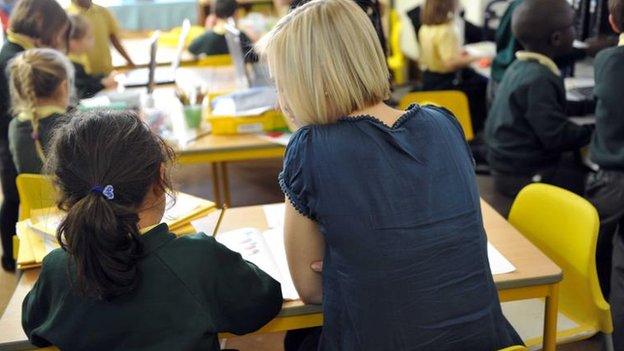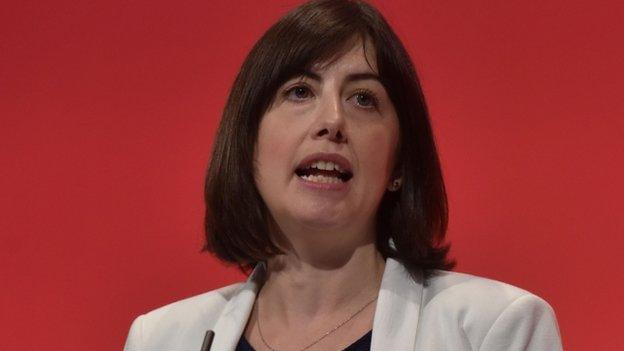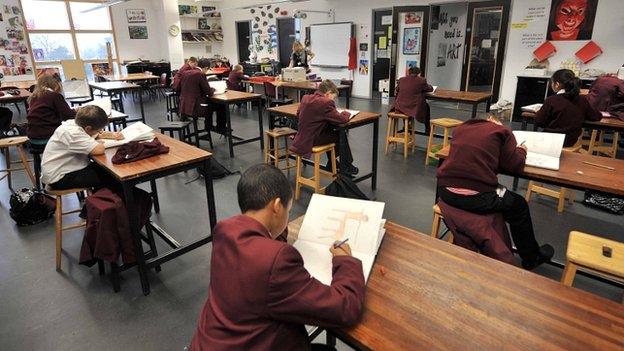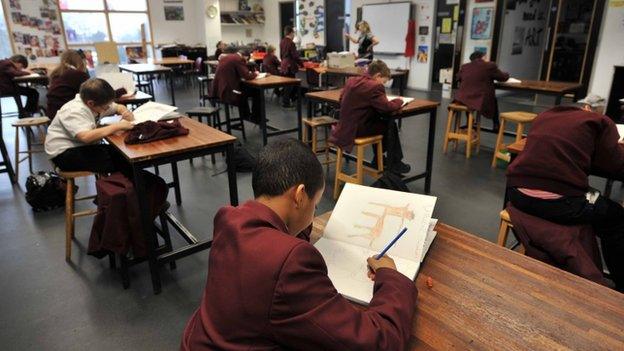Schools in England spend £1.3bn on supply teachers
- Published

Heads have warned of difficulties in recruiting teachers
Schools in England struggling to recruit teachers are spending £1.3bn per year on supply staff, an increase of more than a quarter over two years, says the Labour Party.
Shadow education secretary Lucy Powell says schools face "chronic shortages" of teachers and blamed the government for "talking down the profession".
Last week head teachers warned MPs of deepening recruitment problems.
The Department for Education said Labour's claims were "misleading".
"The number and quality of teachers is at a record high," said a spokeswoman for the education department.
Extra costs
Labour has highlighted figures showing the upward trend in spending on supply staff, which it says reflects the growing difficulties faced by schools trying to recruit teachers.
The amount across all schools has risen by 27% between 2011-12 and 2013-14 with schools on average spending about £59,000 per year on supply agencies.

Lucy Powell says schools face "chronic shortages" of teachers
There are updated figures for 2014-15 for local authority schools which show a further increase.
Labour says the government needs to "get a grip" on making sure schools have enough teachers.
"Ministers have mishandled teacher training, putting applicants off and constantly talked down the profession, causing thousands of teachers to quit," said Ms Powell.
"As a result, half of all schools had unfilled positions at the start of this year and are being forced to turn to unqualified staff, temporary supply teachers, non-specialists, and larger class sizes to try to plug the gaps."
But the Department for Education said: "It is completely misleading to suggest there are chronic shortages of teachers or that a record number of teachers have 'quit' the profession - our increased spending on supply teachers simply reflects our increased total spending in response to rising pupil numbers.
"The overall teacher vacancy rate is 0.3% and has remained under 1% for the past 15 years. The 49,120 that left the profession between November 2013 and November 2014 includes those that left through death or retirement."
'National Teaching Service'
The government has been offering bursaries of up to £30,000 per year to attract graduates in shortage subjects such as maths and science.
There will also be a National Teaching Service, with a pool of 1,500 teachers, which will target underperforming schools which can struggle to recruit staff.
Last week the education select committee took evidence in its investigation of teacher shortages.
Russell Hobby, leader of the National Association of Head Teachers, reported that more than three-quarters of heads had struggled to recruit when they had advertised for teachers or had completely failed to find anyone.
Mr Hobby also warned of the extra cost, saying that agency fees and "finders' fees" to source teachers can cost £10,000 for a single appointment.
Emma Knights, chief executive of the National Governors' Association, said there was a "phenomenal cost" from recruitment fees, when schools were already "constrained by cost".
The National Union of Teachers says schools are being charged recruitment fees of up to 20% of a teacher's salary - and that across a year, schools could face extra costs of up to £100,000.
"This is all money which should be spent on increasing the supply of qualified teachers," said the NUT head, Christine Blower.
John Howson, an expert in the teachers' job market, told MPs that the problem was most acute in London and the home counties. Prof Howson has warned that the current shortage is the worst since 2001-02.
Responding to the supply teacher figures, Chris Keates, leader of the Nasuwt teachers' union, said: "There cannot now be any doubt that schools are in the midst of a serious teacher recruitment and retention crisis, driven by the adverse impact of the government's policies on the school workforce."
An analysis from the National Foundation for Educational Research concluded that there were record numbers of teachers and that rates of staff leaving the profession were not unusually high.
But the research argued that the system of recruiting and retaining staff was failing to keep pace with the rapidly increasing demand for extra teachers, as rising numbers of pupils have seen schools expanding.
- Published9 December 2015
- Published9 December 2015

- Published28 October 2015

- Published27 November 2015
